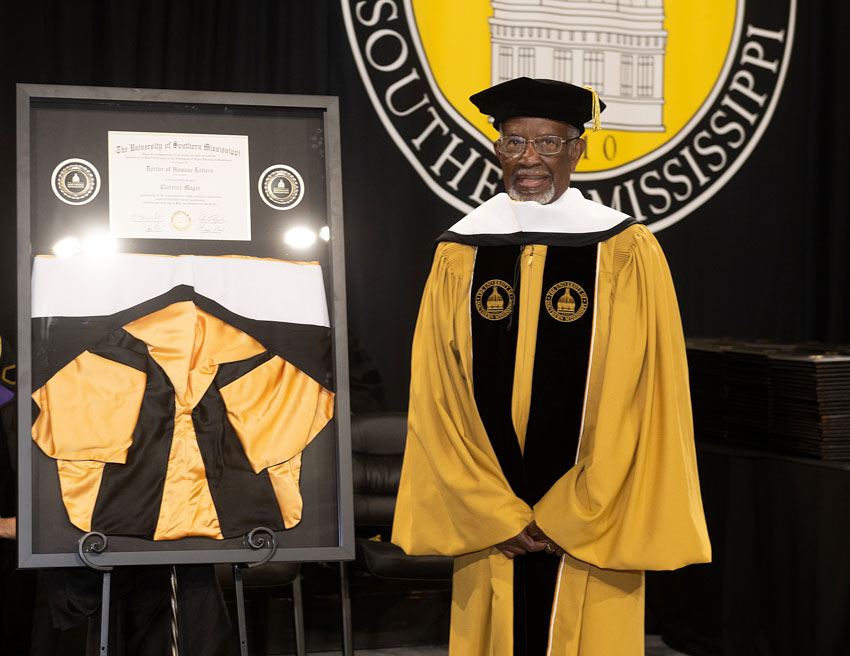The University of Southern Mississippi awarded an honorary doctorate to Clarence Magee during its spring commencement ceremonies last week.
The honorary doctorate is among the highest forms of recognition given by the university. It is presented to individuals who have made significant contributions to the university, the community, or their professional fields.
Magee was unanimously selected by the university’s Honorary Degree Committee, which cited his impact on education and civil rights advocacy in the Hattiesburg region and across Mississippi.
In a 2015 Civil Rights History Project Interview completed by the Southern Oral History Program under contract to the Smithsonian Institution ’s National Museum of African American History & Culture and the Library of Congress, Magee explained that his first awareness of the Civil Rights Movement was in 1956 and centered around the purchase of his first home.
“You own a home, you’ve got to pay property tax,” he explained. “So, every time I’d go pay my property tax, I’d pay my poll tax. So, I started going to the clerk’s office, exercising my right, because I paid a poll tax to register to vote.”
During the Civil Rights History Project Interview, Magee explained that he wants people to remember the courage and legacy needed to sustain civil rights.
“The courage. The legacy that we have the courage to keep on keeping on in spite of the odds,” he said. “To not let their opportunity of making things better pass them by. We have a lot of legacy, a lot of people who invested in what we now call freedom, and if we don’t continue to invest in it, then what will our future generation have to inspire them to keep going?”
Magee was born in Columbia, Mississippi. Raised on his family’s farm, he and his nine siblings developed a strong work ethic and a deep appreciation for education. He became the first in his family to attend college, earning a bachelor’s degree in biology from Alcorn A&M, now Alcorn State University.
After graduation, Magee served in the U.S. Army during the Korean War, with assignments in the United States and Germany.
He began his teaching career in the Wayne County School District and later taught at the Prentiss Institute and Hattiesburg Public Schools. In 1964, he earned a master’s degree in education from West Virginia University.
Magee later transitioned into public service, working with the Southern Mississippi Planning and Development District and the U.S. Department of Agriculture’s Food and Nutrition Service. He remained with the USDA until his retirement in 1998.
Following his retirement, Magee continued to serve the community. He was instrumental in the development of the Francis Street Apartments, an affordable housing initiative in Hattiesburg. He was also a founding member and first secretary of the 1965 Community Action Committee, which contributed to the creation of the P.A.C.E. Head Start program.
Magee has served as president of the Forrest County Branch of the NAACP since 2001. He also testified in the landmark case United States v. Theron C. Lynn, along with 46 others, which helped remove barriers to African American voter registration.
“His work with civil rights national organizations has been supreme and impactful on our local community, the state of Mississippi, and the nation,” said Dr. Eddie Holloway, USM senior associate provost for community and belonging. “He has been a giant among the vast number of educators and leaders who lived and worked in Hattiesburg and throughout Mississippi.”
Magee and his wife, Carrie Mae Bradley Magee, have two daughters, Veronica Magee Jordan and Karen Magee Taylor. The couple also have four grandchildren and three great-grandchildren.
USM Awards Honorary Doctorate to Clarence Magee
Micah Gibbs
|
May 14, 2025
0
Donate to SM2
Your donation will support the student journalists of University of Southern Mississipi. Your contribution will allow us to purchase equipment and cover our annual website hosting costs.
More to Discover




























